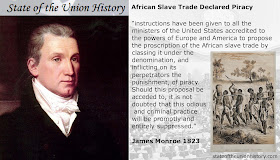"shall suffer death" - The 1820 Piracy law classified the African slave trade as piracy punishable by death. The law was made permanent in 1823, and President Monroe instructed his ministers to advocate for such classification throughout all of Europe. For the first time, the United States took a very strong and unequivocal moral stance against the African slave trade.
For almost 20 years, both Presidents Madison and Monroe worked closely with Congress to pass laws to end the African slave trade. In 1807, Congress passed a law to "prohibit the importation of slaves into any port or place within the jurisdiction of the United States" and imposed a $10,000 fine plus jail time. In 1818, Congress passed amendments to make it easier to prosecute the slave traders, but it wasn't until 1820, that Congress imposed the death penalty for those involved in the Slave Trade. In that year, Congress passed an act which defined the African Slave trade to be punishable under piracy laws, and punishable by death. Finally, America had taken a truly strong stance against the African slave trade. The 1820 Act included two key sections declaring that any American citizen engaging in the African slave trade "shall be adjudged a pirate; and on conviction thereof before the circuit court of the United States for the district wherein he shall be brought or found, shall suffer death."
The law was to be in force for just two years, but Congress made it permanent on January 1, 1823. Now, President Monroe wanted to expand this to the all of Europe. In Monroe's 1823 State of the Union address, he informed Congress that "all the ministers of the United States accredited to the powers of Europe and America" were now given instructions to propose to all of Europe, that the African Slave Trade be classified as piracy punishable by death. The African Slave Trade had persisted even though both America and Great Britain had outlawed it, but Monroe believed that by classifying it as piracy punishable by death, it could finally be "promptly and entirely suppressed".
"In compliance with a resolution of the House of Representatives adopted at their last session, instructions have been given to all the ministers of the United States accredited to the powers of Europe and America to propose the proscription of the African slave trade by classing it under the denomination, and inflicting on its perpetrators the punishment, of piracy. Should this proposal be acceded to, it is not doubted that this odious and criminal practice will be promptly and entirely suppressed. It is earnestly hoped that it will be acceded to, from the firm belief that it is the most effectual expedient that can be adopted for the purpose."The 1820 law was very difficult to enforce, primarily because the Atlantic Ocean was so large for U.S. squadrons to police the waters. Yet the law did curb the slave trade, in part because of bounties that were paid of $50 per slave to informants who tipped off the authorities. The death penalty was less of a threat due to sympathetic juries and judges. In fact, there were no executions of a slave trader until the Lincoln administration fully enforced the laws. Unfortunately the African slave trade continued to linger on and the internal slave trade quickly took it's place, but in 1820 and 1823 the United States of America took a strong moral and unequivocal stance against the African slave trade.
1820 Piracy Act Section 4
And be it further enacted, That if any citizen of the United States, being of the crew or ship's company of any foreign ship or vessel engaged in the slave trade, or any person whatever, being of the crew or ship's company of any ship or ship's company of any ship or vessel, owned in the whole part, or navigated for, or in behalf of, any citizen or citizens of the United States, shall land, from any such ship or vessel, and on any foreign shore, seize any negro or mulatto, not held to service or labour by the laws of either of the states or territories of the United States, with in tent to make such negro or mulatto a slave, or shall decoy, or forcibly bring or carry, or shall receive, such negro or mulatto on board any such ship or vessel, with intent as aforesaid, such citizen or person shall be adjudged a pirate; and on conviction thereof before the circuit court of the United States for the district wherein he may be brought or found, shall suffer death.http://www.presidency.ucsb.edu/ws/index.php?pid=29465
http://www.stateoftheunionhistory.com/2015/07/1810-james-madison-illegal-slave-trade.html
http://abolition.nypl.org/essays/us_constitution/8/
http://legisworks.org/sal/3/stats/STATUTE-3-Pg600.pdf
https://upload.wikimedia.org/wikipedia/commons/6/61/Group_of_men_and_women_being_taken_to_a_slave_market_Wellcome_V0050647.jpg

No comments:
Post a Comment